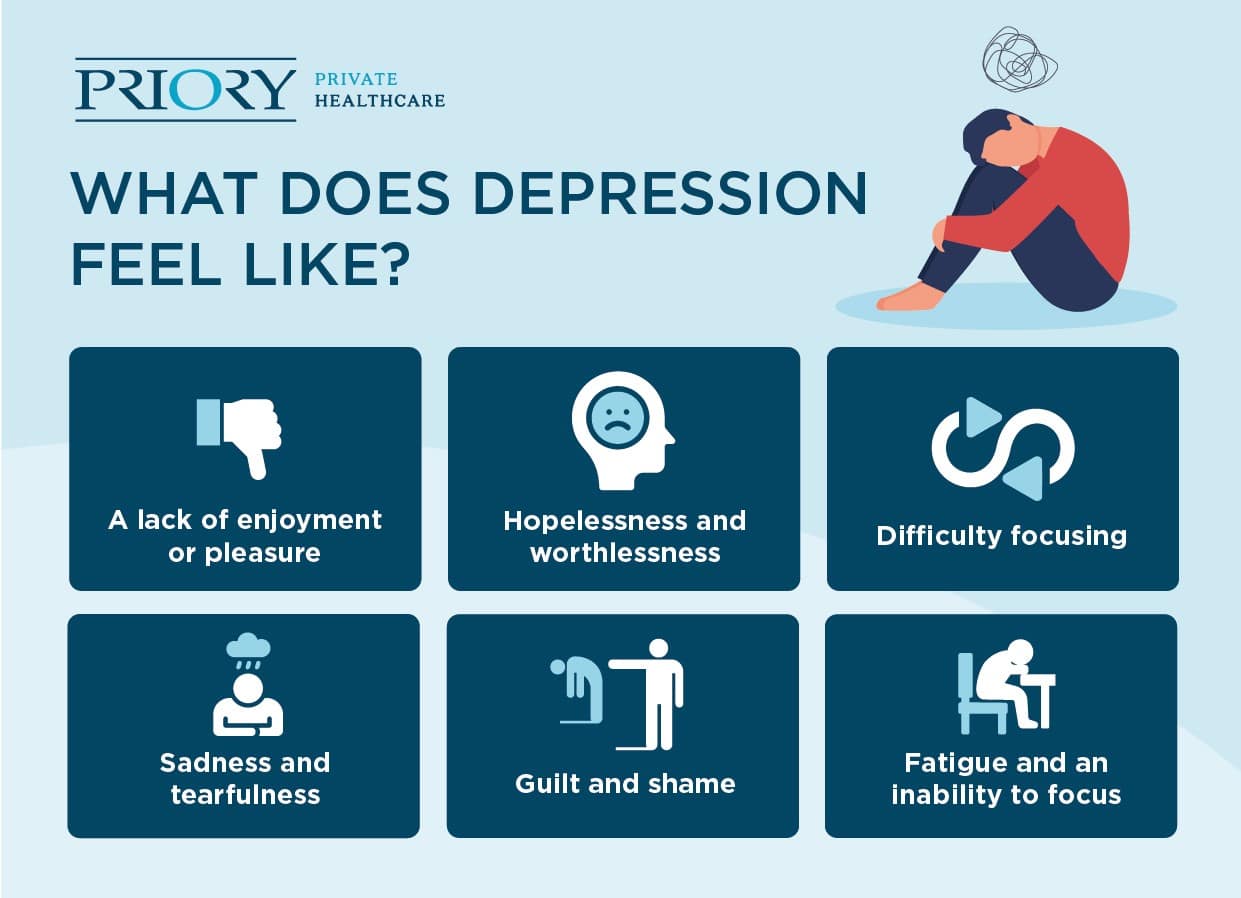What does depression feel like?
Are you feeling depressed? This article details what depression may feel like, including quotes from people who struggle with depression.
Are you feeling depressed? This article details what depression may feel like, including quotes from people who struggle with depression.



Depression is a complex and often misunderstood mental health condition that, according to statistics on depression, affects 280 million people worldwide. It can manifest in various ways, making it challenging for people who haven't experienced it to understand what it truly feels like.
In this article, we explore what depression feels like, including quotes from people who suffer with it. By gaining a deeper understanding of this condition, we can support people to improve their mental health.
One common misconception about depression is that it's simply about feeling sad or down. While sadness can be a part of depression, it's crucial to recognise that the experience goes far beyond that. Depression affects people differently, but there are some common feelings and emotions that many people with depression report experiencing.
It's essential to remember that each person's experience with depression is unique. The intensity, duration, and combination of these feelings may vary from one person to another.
Here are some examples of what depression may feel like:
Depression can cause feelings of guilt or shame, especially if it’s associated with an event like divorce or job loss. You might feel that other people have it worse than you, and therefore you have no right to be depressed. If you’re struggling to commit to daily tasks, like caring for a child, this might also bring feelings of shame or guilt.
People with depression often don’t feel fulfilled or take pleasure from things they once enjoyed. Hobbies are no longer exciting, and even socialising with friends can leave you feeling empty. You might think that nothing you do will be able to bring you joy again.
Depression can rob people of their self-worth, leading them to struggle to motivate themselves or even get out of bed in the morning. You might also feel hopeless, like there’s nothing worth living for, or that the way you feel now is something you’ll experience for life. In the most extreme cases, these things can lead to suicidal thoughts.
People who suffer from depression sometimes describe a brain fog that clouds their mind. It might leave you feeling demotivated, unable to process the things going on around you and as though you have no direction. You might also find it difficult to focus on things, which can reduce your productivity at work and in daily tasks.
Sadness is a fundamental feeling associated with depression. Everyone with the condition will feel sad or low at some time or another. Other feelings, like anxiety and irritability, may build inside you, leaving you feeling upset and overwhelmed. People with depression may also be more tearful than usual, sometimes crying over things that other people might consider to be small or insignificant.

There’s no better way to understand what depression feels like than hearing directly from people who've experienced it. Here are some quotes from real-life depression recovery stories.
“I started to have some issues at work, with fatigue. I was falling asleep in the day even when I wasn’t tired. I ultimately ended up with disciplinary action being taken at work, which caused some friction at home.”
“I was waking up in the early hours unable to sleep; my mind racing with thoughts about work. I would wake up each day feeling full of dread, like a huge weight pressing down on me.
“I didn’t want to go on and I began thinking of ways in which I might take my own life.”
“I couldn’t sleep for a couple of nights. I had really bad thoughts. I just couldn’t cope anymore.”
Depression can manifest in various ways, and the signs and symptoms may differ from person to person. Some common signs and symptoms of depression include:
It's important to remember that not everyone with depression will experience all of these symptoms, and the severity, frequency, and duration may vary depending on the person and their specific type of depression.
There are a number of effective treatment options available for depression, and the best approach often involves a combination of therapies tailored to your needs. Some common treatment options include:
If you or someone you know is experiencing symptoms of depression, it's crucial to get professional help as soon as possible. Early intervention can lead to better treatment outcomes and help to prevent your symptoms getting worse. It's important that you don’t ignore the signs of depression. Untreated depression can have serious consequences, including a negative impact on relationships, work and your overall quality of life.
Consulting with a doctor, therapist, or mental health professional is the first step in addressing depression. At Priory, our depression treatment experts can design a treatment programme that fits your needs, delivered throughout our network of UK mental health hospitals and wellbeing centres.
Remember, depression is a treatable condition, and seeking help is a sign of strength, not weakness. Don't hesitate to reach out for the support you or your loved one needs. Use the information below to take the first step.
